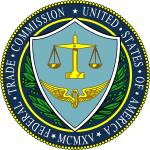
Back لجنة التجارة الفيدرالية Arabic Federal Trade Commission German Federacia Komerca Komisiono Esperanto Comisión Federal de Comercio Spanish کمیسیون فدرال تجارت Persian Yhdysvaltain kauppakomissio Finnish Federal Trade Commission French Federal Trade Commission Italian 連邦取引委員会 Japanese 연방거래위원회 Korean
 Seal of the Federal Trade Commission | |
 Flag of the Federal Trade Commission | |
| Agency overview | |
|---|---|
| Formed | September 26, 1914 |
| Preceding agency | |
| Jurisdiction | Federal government of the United States |
| Headquarters | Federal Trade Commission Building Washington, DC |
| Employees | 1,123 (FY 2021)[1] |
| Annual budget | $425.7 million (FY 2024)[2] |
| Agency executive |
|
| Website | ftc.gov |
| Footnotes | |
| [3][4] | |
The Federal Trade Commission (FTC) is an independent agency of the United States government whose principal mission is the enforcement of civil (non-criminal) antitrust law and the promotion of consumer protection. The FTC shares jurisdiction over federal civil antitrust law enforcement with the Department of Justice Antitrust Division. The agency is headquartered in the Federal Trade Commission Building in Washington, DC.
The FTC was established in 1914 by the Federal Trade Commission Act, which was passed in response to the 19th-century monopolistic trust crisis. Since its inception, the FTC has enforced the provisions of the Clayton Act, a key U.S. antitrust statute, as well as the provisions of the FTC Act, 15 U.S.C. § 41 et seq. Over time, the FTC has been delegated with the enforcement of additional business regulation statutes and has promulgated a number of regulations (codified in Title 16 of the Code of Federal Regulations). The broad statutory authority granted to the FTC provides it with more surveillance and monitoring abilities than it actually uses.[5]
The FTC is composed of five commissioners who are nominated by the President and subject to Senate confirmation. Commissioners serve seven-year terms, and no more than three FTC members can be from the same party. One member of the body serves as FTC Chair at the President's pleasure, with Commissioner Lina Khan having served as chair since June 2021.
- ^ "FTC Agency Financial Report" (PDF). ftc.gov. Retrieved August 27, 2022.
- ^ "H.R.2882 – Further Consolidated Appropriations Act, 2024". Congress.
- ^ "Ten Years of the Best Places to Work in the Federal Government® Rankings" (PDF). bestplacestowork.org.
- ^ "Federal Trade Commission: A History". FTC.gov. January 18, 2012. Retrieved August 14, 2012.
- ^ Van Loo, Rory (October 1, 2019). "The Missing Regulatory State: Monitoring Businesses in an Age of Surveillance". Vanderbilt Law Review. 72 (5): 1563.